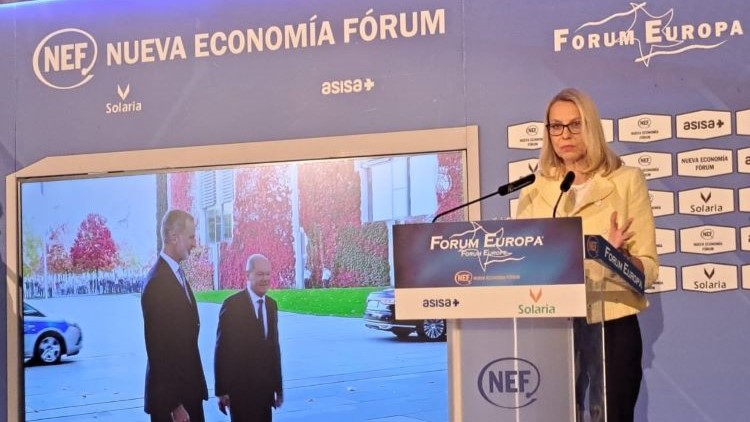The Diplomat
Germany’s ambassador to Spain, Maria Margarete Gosse, said yesterday that the invasion of Ukraine has come as a “brutal shock” to her country’s entire “foreign and energy policy”, including a “180-degree” turn in its security and defense policy, because of the “very close relationship” that existed between Germany and Russia in the two areas.
“The brutal attack against Ukraine, a peaceful country,” is “unacceptable for Europe and “has many features of an imperialist war,” the ambassador declared during a breakfast briefing organized by New Economy Forum in Madrid. In the case of Germany, which had “a very close relationship with Russia” and a great energy dependence on this country, the invasion has meant “a brutal shock for the whole political community, because all our foreign and energy policy of the previous two decades have been dissolved”, she admitted.
According to the ambassador, the invasion of Ukraine received an “immediate” response from the then newly appointed Chancellor Olaf Scholz, “who two days after the invasion announced a 180-degree turn in Germany’s security and defense policy.” Apart from providing Ukraine with “all the support necessary to restore peace and territorial integrity,” the German authorities found that there were “many shortcomings” in security, which resulted in “the decision to dedicate an extra fund, outside the normal budget, of 100 billion euros to restore defense capabilities.” Germany has also “committed itself, within a relatively short period of time, to reach the two percent of GDP defense investment that NATO is asking of us.”
However, she warned, “this whole situation has geostrategic consequences that go far beyond that.” “We have to think about defense and security also in much broader terms, bringing together geo-strategy with geo-economics, and that is why we are also developing a comprehensive security strategy” that addresses other non-military issues, such as “the resilience of society, energy aspects and aspects of dependence, because dependence on Russian gas has clearly shown us that it is an issue that we have to deal with much more,” she said.
In the ambassador’s opinion, the conflict has forced the whole of Europe to “think strategically”. However, she warned, “we have to think not only about the situation now, but about what is going to come after, even if we don’t know how the war will end.” “Let’s not forget that Russia is still a very important country for Europe and even if we come out of this disaster, we have to find some way, how to deal with Russia,” she explained.
Scholz himself, she recalled, “has said that we must not forget that there is a different Russia,” represented by dissidents, people who “do not agree” with the actions of Vladimir Putin’s regime. “We have to keep in touch, so that maybe these people one day can come back and can build a Russia that shares values with Europe,” she said.
On the other hand, the ambassador applauded the independence shown by the European Central Bank (ECB) in dealing with rising inflation in the Eurozone. In her opinion, it is “very important” that the European Central Bank, “in agreement with all the central bank governors involved”, has “remained firm in following its own path to fight inflation at the critical moment when some banks in the United States have slacked”.
The event was presented by the Minister of Justice, Pilar Llop, who praised the “important cooperation” with Germany “in such sensitive matters as organized crime, drug trafficking, arms trafficking and human trafficking” and, above all, “in the field of digitalization of judicial, cross-border cooperation.” “Spain and Germany inaugurated last year the system of electronic transmission of European investigation orders,” she recalled. “Our countries made the first exchange, which took place between the Central Court 5 of the Audiencia Nacional and the Cologne Prosecutor’s Office in Germany,” she said.







